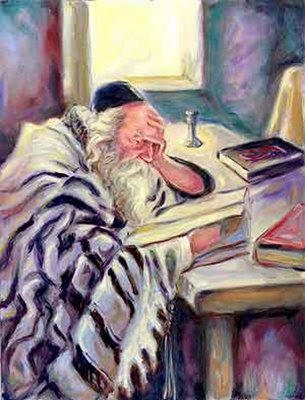
"Light of Torah" von Elie Benzaquen
B"H
The small Ukranian town Medziboz only became famous due to the Baal Shem Tov who used to live there from 1740 – 1760. In those days, Medziboz used to be one of the biggest towns in the Ukraine;
there were 545 Christian and 219 Jewish households in Meziboz. Altogether 5000 Jews of whom one – third was Jewish. The inhabitants mostly earned their living as merchants, as the town's location between Lwov and Kiev was more than convenient.
Rabbi Baruch ben Yechiel of Medziboz was born in 1753 and died on 18th Kislev 1810 (see "Encyclopedia of Chassidut" by Yitzchak Alfassi). Already Rabbi Baruch's mother was more than famous, as her name was Adel and she was the daughter of the Baal Shem Tov. His father was Rabbi Yechiel Ashkenazi. The younger brother of Rabbi Baruch was the well - known Rabbi Chaim Ephraim of Sudlikov (the "Degel Machane Ephraim"). It is said that Baruch of Medziboz inherited the fiery temperament of his mother Adel.
When someone like him comes from such a famous chassidic family background, one usually becomes a rabbi himself in order to keep of the family tradition. And thus for a short period of time, Rabbi Baruch studied with the successor of the Baal Shem Tov, with the Maggid of Mezritch (Rabbi Dov Bear Friedman). Then he studied at the school of Rabbi Pinchas Shapira of Koretz. Later, Rabbi Baruch married the daughter of the wealthy Rabbi Tuvia of Ostrova and settled in Tulchin (Ukraine).
Unfortunately, hie first wife died and when Rabbi Baruch married for the second time, it was the daughter of the relative and Rabbi Aharon of Titov. With his second wife he moved to Medziboz where he bought a great house and even horses. Rabbi Baruch didn't consider it as a contradictory being a famous chassidic rabbi and, at the same time, leading a wealthy lifestyle.
It is not easy to determine Rabbi Baruch's character today. He considered himself as the "real" successor of the Baal Shem Tov because the great chassidic master was his grandfather. Nevertheless, there was a fraction of three rabbis against him and those three were Rabbi Levi Yitzchak of Berditchev, Rabbi Shneur Zalman of Liadi (the Chabad founder) as well as the Seer (Chozeh) of Lublin, Rabbi Yaakov Yitzchak Horowitz. A further critic of Rabbi Baruch was Rabbi Nachman of Breslov.
All the disputes didn't keep new Chassidim from coming in order to study with Rabbi Baruch of Medziboz who eventually had a few hundred followers. And another positive point was that he was very friendly with Rabbi Menachem Mendel of Vitebsk.
Today there are different versions about the dispute between Rabbi Baruch and Rabbi Shneur Zalman of Liadi. However, Rabbi Baruch considered himself as more "special" because he was related to the Baal Shem Tov and, according to his opinion, he was the one who interpreted the teaching of his grandfather in the right and authentic way. Already the Maggid of Mezritch admitted that he himself interpreted the teachings of the Baal Shem Tov according to his own understanding.
And this is a problem today, as we don't always know the original teachings of the Baal Shem Tov. All the rabbis after him changed some teachings according to their individual understanding.
Later on, also Rabbi Shneur Zalman of Liadi interpreted the Chassidut according to his thoughts and opinions. No wonder that Rabbi Baruch was angry about all the different versions and everyone claiming something else. When Rabbi Shneur Zalman published his TANYA, Rabbi Baruch got extremely upset. In 1808, Rabbi Shneur Zalman came down to the Ukraine in order to raise funds and Rabbi Baruch considered this as trespassing into his territory.
There is no doubt that Rabbi Baruch had the advantage of being related to the Baal Shem Tov, and his "competitor", Rabbi Shneur Zalman of Liadi had never met the chassidic master. For Rabbi Baruch was Rabbi Shneur Zalman not an "original" Chassid although the latter loved to say that he is the "spiritual grandson" of the Baal Shem Tov.
The Baal Shem Tov emphasized the concept of the Zaddik (righteous) but the chassidic Rebbes after him turned it into a real concept (e.g. Rabbi Elimelech of Lejansk). According to Rabbi Baruch, the Zaddik has to be the center of the community. He is the most important person and the Chassidim are supposed to learn from him.
Quite often, Rabbi Baruch of Medziboz suffered from depression and melancholy and his Chassidim tried to cheer him up.
The Rabbi didn't leave any writings of his own and when he passed away, his Chassidut died out.
He was survived by three daughters who all married rabbis; however, he had no son and thus no successor.









What was amazing about Baruch was his fiery temperament. He would yell at his chassidim when they came to see him, yet they all walked away uplifted. And in terms of anivus, just listen to this saying of his: "if there are 1,000 righteous people in the world, I'm one of them. If there are 2 righteous people in the world, I'm one of them." I can't believe he would say that!
ReplyDeleteYisroel in New York
B"H
ReplyDeleteHi Yisroel,
Do you know that I was asking myself what is means when authors like Yitzchak Alfassi or Tzvi Rabinovicz say that Rabbi Baruch had a fiery temperament ?
It could be positive or negative but no further explanation was given. And I thought that one of the reasons may have been the determination he was following his concepts.
However, it seems that in those early days of Chassidut, many got carried away by their strong personality. For instance, also Rabbi Nachman of Breslov claimed to be the Zaddik of the generation.
And later, the Seer of Lublin considered himself as more than outstanding.